If you’re experiencing a problem with your guitar pickups cutting out, trust me, I know how annoying that can be, and it always seems to happen at the worse possible time! The answer is that many things can cause the problem, including a worn-out guitar cable.
I wrote this article to help you methodically troubleshoot every aspect your situation and quickly find the solution! Before you burn and smash your favorite guitar, as Jimi Hendrix did at the Monterey Pop Festival, please try my suggestions!
You can use the table of contents below to take you to the area that interests you. Click on the little box to open it, and then click on the section of the article you want to read, or you can read from start to finish if you want the full troubleshooting experience!
The Short Answer
A failure of the pickup itself is much less likely to be the cause of your problem unless the guitar has been physically abused in some way or is very old.
Guitar pickups do not move, except when their height is adjusted, and they are well protected inside the guitar, so it’s unlikely they will stop functioning correctly.
You’re probably looking at a problem with the guitar cable or jack, a dead battery (if you have active pickups), or a worn-out or oxidized pickup selector switch, volume, or tone control.
Keep On Reading To Learn More
What Are Guitar Pickups (Brief Introduction)?
If you already know about pickups, you can skip this section, and we’ll get right to finding the cause of your problem.
A guitar pickup is a device (transducer) on your guitar that “picks up” the sound from your strings and sends it to the amplifier.
It is made from a set of permanent magnets wrapped with a coil of wire. When the string above each magnet is plucked, it disrupts the magnetic field. This creates an electromagnetic force in the coil of wire that represents the sound you are playing and sends a current through the guitar cable to the amplifier.
This audio signal is amplified and comes out of your speaker as music.
Guitar pickups come in two configurations, single-coil and double-coil (humbucker).
Single-Coil Pickups
Single-coil pickups are susceptible to electromagnetic interference that sounds like noise in your amplifier. Some “noiseless” single-coil pickups are actually two coils stacked one upon another to fit in the guitar’s pickup cavity, wired together to cancel out the noise.
Double-Coil (Humbucker or Humbucking) Pickups
Humbucker pickups have two separate coils, wired together side-by-side to cancel out hum (electromagnetic interference). They require a wider pickup cavity than a single coil design.
Humbucker pickups also have the advantage of a more robust output signal than single-coils, so they can naturally overdrive the amplifier and give each note more sustain.

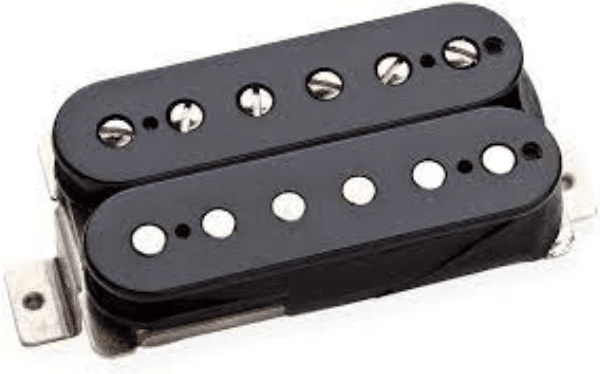
Troubleshooting Checklist

Here are the reasons your guitar pickup(s) might be cutting out or not working at all. They are listed in order of generally the most common to the least common causes. Begin at the top of the list and work your way down until you discover the problem.
You can click on each item in the list to learn more.
- It’s Not Your Guitar, It’s Something Else
- Pickup Preamp Battery Is Dead (Active Pickups Only)
- Broken Wire Or Bad Solder Connection
- Pickup Selector Switch
- Volume And Tone Controls
- Broken Or Shorted-Out Pickup Coil Wire
- Demagnetized Pickup
- Pickup Preamp Is Faulty
Keep On Reading To Learn More About Each Topic
Problems Not Caused By The Guitar
The problem may not be with your pickup(s) or anything else in your guitar.
If you have another electric guitar, plug it into the same setup, and if the problem persists, you just eliminated something in your guitar as the cause.
Try using a different guitar cable and then check to be sure it’s not a problem with the guitar amplifier. You can plug your guitar into your stereo or your home recording studio if you don’t have another guitar amp.
If you have anything else connected between your guitar and amp, like stomp boxes or an effects board, remove them to see if that corrects the problem.
I once had someone bring me a “broken” solid-body electric guitar with nylon strings! She didn’t believe me until I put steel strings on the guitar and plugged it into an amp.
Pickup Battery Problem
If your guitar has active pickups, it has a battery, or the pickups are rechargeable. The battery powers the preamp for the pickup electronics.
Most guitars with active electronics are powered by a battery, which can be found in a battery compartment or the guitar control cavity.
Some guitars have rechargeable pickups that have to be plugged into USB ports.
To learn more about guitars with rechargeable active pickups, check out my review articles on Reverend Greg Koch Signature Gristlemaster – Killer Tone! and Reverend Greg Koch Gristle 90 – Noiseless P90 Pickup Magic!
If your pickup battery becomes weak, you can usually hear a decrease in the guitar’s volume or a change in its tonal characteristics. This happens before the battery goes completely dead; this is an excellent time to replace or charge it. Always keep extra fresh batteries or a USB cable and charger in your guitar case.
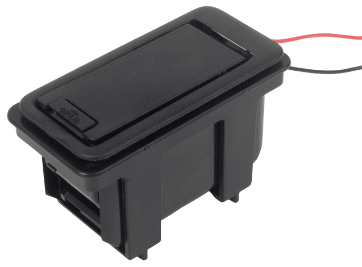
Broken Wire Or Bad Connection Problem
Begin by checking the guitar cable jack, where you plug the cable into the guitar. Sometimes the jack wears out, or the pieces that make contact with the cable plug become oxidized. Check the nut on the guitar jack and tighten it if it feels loose. Telecaster guitar jacks are tortuous for coming loose.
If that doesn’t solve your problem, you’ll need to look inside your guitar to troubleshoot the issue further. If you don’t feel comfortable doing this, take the guitar to a certified guitar tech.
Begin by looking to see if any wiring appears loose or if a solder connection looks bad. Plug the guitar into the amp and gently wiggle the wiring. If this reproduces the problem in your amp you can replace or re-solder the wire.
A multimeter is useful for checking the electrical continuity of wires and connections.
Pickup Selector Switch Problem
If your guitar has more than one guitar pickup, it has a pickup selector switch.
Troubleshooting the selector switch can usually be done by moving it back and forth and listening for static or a disruption of the guitar output signal in your amplifier. Moving it enough times may also resolve the problem by cleaning the contact points.
Some older Strat guitars may have had their 3-position selector switch wedged at “in-between” positions to use the neck and bridge pickups in combination with the middle pickups for out-of-phase sounds. This can eventually loosen the contact points. If you replace the switch, consider installing a 5-position unit.
You may have to evaluate the selector switch by checking the electrical continuity with a multimeter.
The switch contact points may need to be sprayed with a cleaner such as DeoxIT to remove any oxidation or dirt build-up
Volume And Tone Control Problem
As your volume and tone controls (called “pots” or potentiometers) are turned, the wipers inside can wear out over time. If the guitar is not used in a while, the pots can become oxidized
The volume pot is used more than the tone control, so that’s usually the culprit.
If the pickups cut out at a particular volume setting, the pot is probably broken and may need to be replaced. If the guitar makes a “scratchy” sound as you rotate the pot, it most likely needs to be cleaned (deoxidized). Check the pot’s electrical continuity with a multimeter while you turn it.
Beginner’s guitars usually have cheaper electronics, especially the pots and pickup selector switch. If you change a pot or the selector switch, installing a high-quality unit is worthwhile, especially if you plan on keeping the guitar for a while.
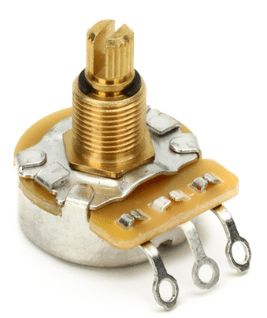
Control (Pot)
Pickup Coil Wire Problem
It’s possible that the copper wire that forms the pickup coil can break or the thin wire insulation can fail and cause an electrical short in the pickup.
This is unlikely unless the guitar pickups have been mishandled, kept in a high humidity environment, exposed to temperature extremes, or have oxidation or rust on the magnets that travels down to the coil wire and disrupts the wire’s insulation.
It’s more likely that the copper coil wire will break where it is connected to the large black and white wires coming off the pickup. Inspect the solder joints in this area and ensure the coil wire has not broken.
You may need to use a multimeter to measure the pickup’s DC resistance. Single-coil pickups usually measure about 5.5 to 6.5 KOhms, while humbucking pickups can measure much higher (between 6K and 20K ohms).
Check with the pickup manufacturer to get the exact DC resistance specifications. Disconnect the pickup from the rest of the circuit before taking a measurement.
Pickups with an electrical short have no electrical resistance or, in rare cases, may have a lower reading than normal. Pickups with a broken or disconnected wire will have no electrical conductivity.
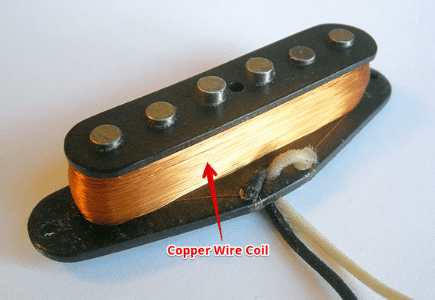
Pickup Magnet Problem
A guitar pickup contains permanent magnets, as per the explanation above. Over time these magnets can lose their strength, adversely affecting the output signal and quality.
If a pickup is no longer working, it’s possible that the magnets were exposed to a strong electromagnetic field that demagnetized the entire pickup, but this is a rare cause of the problem.
The pickup would need to be replaced or taken apart so that new magnets can be installed. It is also possible to remagnetize the original magnets if it is a vintage pickup.
If you gently tap the top of a pickup and it works, even for a short time, the problem is more likely to be in the pickup’s wiring than the magnets.
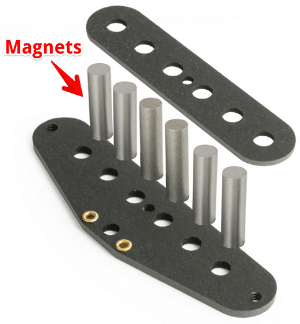
Pickup Preamp Problem (Active Pickups)
Active guitar pickups have a battery-powered preamp and graphic equalizer circuit that controls the pickup’s volume and tone. The circuit can be attached to the pickup or separated from it.
For example, the Fender Eric Clapton Signature Strat has three Lace Sensor or Vintage Noiseless pickups (depending on the model) connected to a separate circuit board. The circuit essentially acts as a midrange boost. You may need to replace the board if everything else checks out on the guitar.
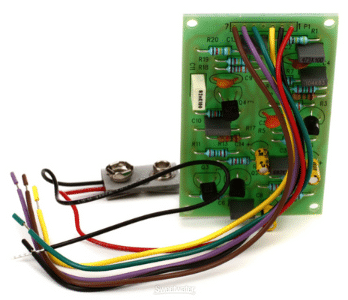
(Eric Clapton Guitar)
EMG active pickups may have preamp circuits attached to each pickup and pots like the EMG Super 77 Active Humbuckers or a common preamp board, like EMG DG-20 David Gilmour single-coil pickup set.
The broken components on these two systems may have parts that can be replaced individually.
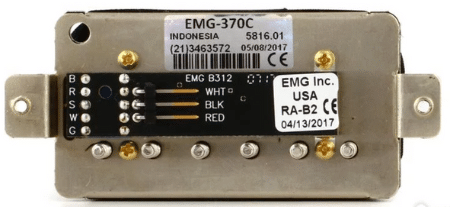
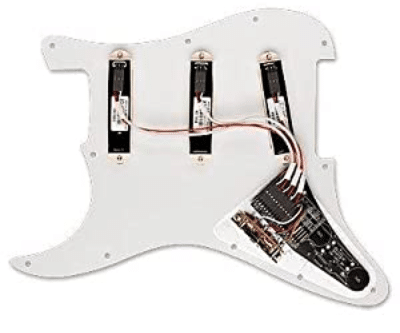
Single-Coil Set
Beware Of Part Replacement Vs. Repair!

Replacing or upgrading parts on an expensive designer or vintage guitar, especially the pickups, could significantly lower its retail value, even if you keep the originals.
Collectors like to see all original parts on guitars without repairs, right down to the factory solder joints. It’s better to repair a vintage part or pickup than replace it. If you have to replace it, keep the broken original in case you sell the guitar down the road.
Are You Qualified To Make Guitar Adjustments Or Modifications?
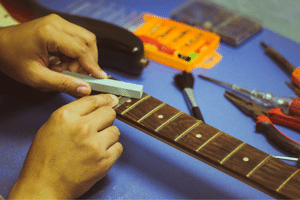
It’s great to work on your guitars, especially if you have a lot of them, but you should always be aware of your limitations.
Adjusting things like an electric guitar’s string height (action) or pickup height can be straightforward. Still, some adjustments require the proper training and experience, like adjusting a guitar’s truss rod.
When you doubt your ability to adjust, repair, or modify your guitar, it’s always best to bring it to a competent guitar technician or luthier (guitar designer & builder). You can permanently damage your guitar, and it might never play and sound right again!
Making modifications to your guitar can void its manufacturer’s warranty and cause permanent damage to the instrument. Certain modifications are irreversible, so you may be stuck with them, even if you desperately want to restore the guitar to its original condition!
I learned that the hard way over the years until I did a three-year apprenticeship in a guitar repair shop. Now I have my own home workshop with the proper training and equipment to safely maintain and repair all my instruments.
Remember: “When In Doubt, Send It Out!”
Frequently Asked Questions

Here are some of the questions I get asked about guitar pickups.
If your question does not appear here, please put it in the comments, and I will get right back to you with an answer.
Should You Clean Pickups?
Guitar pickups need very little maintenance. When you clean your guitar, you can wipe the top of your pickups with a microfiber cloth, Be careful not to get them wet, which can cause the magnets and coils to rust and malfunction.
How Do You Fix A Loose Guitar Pickup?
If your pickup becomes loose, try adjusting the height screws, but don’t change the pickup’s height too much, or you will change the pickup’s sound. You can use different size springs or lengths of rubber tubing on the height screws. I have used a piece of high-density foam on the back of a pickup to keep it from moving.
Can Guitar Pickups Be Repaired?
Yes, but you should not attempt to repair it if you don’t have the proper training and experience, especially if it is an expensive or vintage guitar. Instead, bring it to a certified guitar tech.
How Much Does It Cost To Fix A Guitar Pickup?
The price can vary depending on the situation. A vintage pickup is the most expensive to fix because all the materials must be “period-correct” to have it sound right and keep its value. A repair can easily cost $50 to %100 or more.
How Long Do Guitar Pickups Last?
Pickups last a variable amount of time, but on average, you can expect a pickup to last about 50 to 75 years before its sound changes appreciably or it malfunctions.
Do Pickups Lose Output Over Time?
Yes, as the pickup ages, the magnets lose power, which results in lower signal output. The pickup also tends to sound more mellow with a less trebly response, which can be popular among Jazz players.
Final Thoughts About Guitar Pickups Cutting Out

A Guitar can stop working for various reasons, so don’t automatically assume the pickup is broken. It’s more common for the problem to be in the pickup selector switch, wiring, or even a problem with your guitar cable or amplifier.
The best approach is to the problem follow the troubleshooting checklist in this article. Start from the top of the list and work your way down until you find the problem.
To avoid damaging electronic components, be sure to use the proper cleaner, like DeoxIT, on switches and contacts.
Guitars with active pickups can be particularly challenging to diagnose and fix. Always change or recharge the battery before doing anything else.
If you don’t have the proper training and experience, I recommend you exercise caution when taking your guitar apart since you could cause permanent damage to your instrument. If the guitar is expensive or vintage, consider taking it to a certified guitar technician.

Tell Me What You Think

Please leave a comment below if you enjoyed this article, have any questions about guitar pickups, or want to give your point of view. I will be happy to help you.
- Do you have any tips or tricks for dealing with guitar pickup problems?
- What was the worst electronic problem you ever had with a guitar? How did you fix it?
- After reading this article, do you feel confident that you can find and repair the problem?
- What else is on your mind?

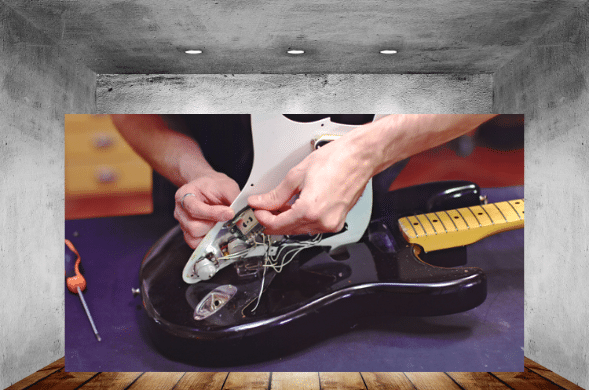



I am extremely happy to have found your blog. I have been planning to learn to play the guitar for some time. I have everything I need for that here. In addition to teaching people how to play the guitar, you really try to give detailed information about technical things, which is very important. The instrument must be maintained in order to make good music.
Hi There
Thank You for your kind remarks!
I think learning to play the guitar is an outstanding idea! Once you begin, you will be hooked, and your life will be filled with musical enjoyment!
The first step is getting yourself a guitar. You don’t have to spend a lot of money, but you have to decide if you want an acoustic or electric instrument. Generally, the electrics are a bit easier to learn on, as a beginner.
I hope you will revisit my website often. Please don’t hesitate to leave me a comment if you have any specific questions!
Frank 🎸
I must say, this article is very, very, very helpful and I really appreciate your effort. Thank you!!!
Hi John
You’re entirely welcome!
I hope you were able to solve your pickup problem.
Please let me know if you need additional information.
Rock On!
Frank
This is a really useful and valuable article – I’ve been playing for 35 years and never bothered to find out as much as this has taught me in an afternoon read – it all makes perfect sense and now I can stop turning away in shame when conversations get technical (when it comes to pick ups at least). But I will be looking into much more of your site after reading this!
Hi, Stephen
Thank You for your comments!
I’m really happy that you found my article helpful! Let me know if you are having an ongoing problem with your guitar, and perhaps I can help!
Hope to have you come back and visit again soon!
Frank 🎸
great site for trouble shooting strat pickup problems…. my vintage(1971) strat got some new lite strings with the hi-E string being a .007 gage. it is the only string that experiences a volume loss when solo-ing up the neck (as compared to the B-string volume). cranking up the volume minimizes the volume lose, but its disturbs me at the lower volume setting. same effect with any of the 5-position settings being selected. didn’t seem to have this problem with heavier gauge strings. tried bumping down the distance to the E-string with the hite setting screws on each pickup. any clues as to what may be causing this to happen (maybe a capacitor?)…
Hi, Keven
Thank You for your question!
Wow, I used to play on Dan Armstrong 0.007s when I was in high school, way back in the early seventies. Now Dunlop is making a 0.007 set (Rev. Willy’s Lottery – Billy Gibbons strings), and I assume that’s what you are using.
If you raised the screw on the pickups under your high-E String and it didn’t improve the volume, I would try raising the height of the high-E string a bit. It sounds like it is fretting-out higher up the neck. It doesn’t take much for a string that thin to lose vibrational energy.
Let me know how you make out!?
Frank ?